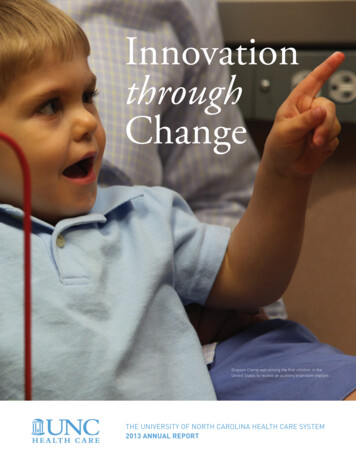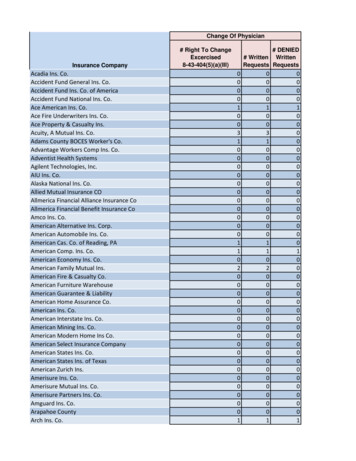
Transcription
InnovationthroughChangeGrayson Clamp was among the first children in theUnited States to receive an auditory brainstem implant.THE UNIVERSITY OF NORTH CAROLINA HEALTH CARE SYSTEM2013 ANNUAL REPORT
COVER PHOTO COURTESY OF STEPHANIE MAHINCONTRIBUTING WRITERSTONI BOWERMANJENNY DEWITTAMY FULKSTEPHANIE SOUCHERAY-GRELLMacNider Hall, the first building constructed as part of the medical school complex.PHOTO CREDITSBRIAN STRICKLANDPAUL BRALY, TARHEEL IMAGESUNC HOSPITALS’ DEPARTMENT OF NUTRITION AND FOOD SERVICESKAREN FRANKEMICHELLE JORDY, TEACCH AUTISM PROGRAMNICOLE CLAMPKENT CORLEYUNC HEALTH CARE INTERPRETER SERVICESTOM FULDNER PHOTOGRAPHY
Table of ContentsintroductionInnovation for the Future of Health Care2UNC Health Care System Update4Unique Partnership Fills a Need in Mental Health Care811Academic Medicine Advances Patient CareNew Leadership and Unique Programs Show Continued Promisefor the Future of the Department of Allied Health Sciences14Community Benefit Report 201316financials and statisticsLetter of Transmittal20UNC Health Care System Reporting Structure23The Board of Directors24Management’s Discussion and Analysis25Pro Forma Statement of Net Position28Pro Forma Statement of Revenues, Expenses, and Changes in Net Position29Pro Forma Statement of Cash Flows30UNC Faculty Physicians Statement of Net Position (Unaudited)31UNC Faculty Physicians Statement of Revenues, Expenses,and Changes in Position (Unaudited)32UNC Faculty Physicians Statement of Cash Flows (Unaudited)33Pro Forma Selected Statistics and Ratios34Notes to Financials352013 ANNUAL REPORT1
Innovation for the Future of Health CareHealth care is changing more rapidly than ever. Growth and innovation areessential for health care organizations to effectively meet the challengesthat change presents. As we reflect on the past year, it is clear that UNCHealth Care is striving toward change that advances our mission.We continue to collaborate with our partnersand leaders across the state on innovationsthat will allow us to meet the challenges ofthe future. Change is both a challenge andan opportunity to connect our guidingprinciples to the advancements that lead usinto the future. Our partnerships with otherhospitals across the state, our advances in theway we deliver care and our efforts to trainthe next generation of our state’s physiciansposition us well to lead.This Annual Report features stories abouthow we are changing for the benefit of allNorth Carolinians. Our commitment toinnovating for the patients we serve and thequality of care we provide is unwavering, nomatter what demands tomorrow brings.ACCOMPLISHMENTSAdvances in care, teaching and research2UNC HEALTH CAREwould not be possible without the talentedindividuals who make up our organization.UNC Health Care, its affiliate hospitals,physician networks and the UNC Schoolof Medicine have all earned recognition fortheir hard work.Rex Healthcare in Raleigh and PardeeHospital in Hendersonville were eachhonored with an “A” hospital safety score bythe Leapfrog Group. This is evidence of ourcommitment to provide better, safer care toour patients.UNCHospitalsearnedadvancedcertification from The Joint Commissionand the American Heart Association/American Stroke Association as aComprehensive Stroke Center. UNCHospitals is one of only 15 hospitals inthe country and the first hospital in theSoutheast to receive the designation.UNC Hospitals was designated a U.S.News & World Report Best Hospitals top50 facility for cancer (#43), gynecology(#44), and ear, nose and throat (#22). Wealso were recognized as “high performing”in eight specialties: cardiology and heart surgery diabetes and endocrinology gastroenterology and GI surgery geriatrics nephrology neurology and neurosurgery pulmonology urologyWe were among 147 facilities—roughly3 percent of more than 4,800 hospitalsanalyzed by the publication—to beranked in at least one of the 16 specialties.
The UNC School of Medicine, with itscampuses in Chapel Hill, Asheville andCharlotte, also was recognized nationally asa leader in medical education.County’s outpatient mental health services,and we have plans to develop and operateat least 12 more inpatient psychiatric bedsin the area.The School was ranked No. 1 in thecountry for Primary Care by U.S. News &World Report. We are particularly proudof this accomplishment, because wehave redoubled efforts to emphasize theimportance of primary care physicians.WakeBrook and our larger efforts toimprove mental health in Wake Countyprovide much-needed services to a fragileand important population. We believe thismodel can be adapted throughout the stateto enhance and coordinate the needs ofthose requiring behavioral health services.In North Carolina, the physician-to-patientratio continues to dwindle, particularlyin rural and underserved areas. Our stateranks in the lower half of the country—with fewer than five physicians for every100 residents. We are hopeful that ourSchool’s excellent ranking will continueto attract the best students to train andpractice medicine in our state.The School also was ranked #6 overall and#22 for Research and was recognized forFamily Medicine (#2), Rural Medicine (#5)and AIDS (#9)—leading in crucial programsthat make a real difference in our patients’lives. In a time when research dollars arescarce, the School contributed 391 millionin 2012 research funding, which is morethan half of all funding for research at theUniversity of North Carolina at Chapel Hill.INNOVATION IN CAREWe continue to investigate newopportunities to support our mission toimprove access to and delivery of carethroughout the state. One such exampleis our assumption of administration of theWakeBrook Campus in Raleigh, a crisiscare facility that was previously operated byWake County.WakeBrook helps us ensure patients seekingmental health services have greater access toa high-quality, streamlined care experience,all while alleviating the burden on localemergency departments. The campusofficially reopened under our managementin September 2013, with a 16-bed inpatientmental health wing similar to the psychiatricunit we run at UNC Hospitals. We also havecommitted 10 million to enhance WakeWe also recently finalized a partnershipbetween two of the state’s top cardiologypractices to form North Carolina Heart& Vascular. The combination of twolongstanding practices in central andeastern North Carolina brings togetherlong histories of providing excellent careand realizing successful outcomes forthousands of patients every year.North Carolina Heart & Vascular has nearlythree dozen physicians working out of 10counties who will work together to improvepatient care and outcomes and to conductthe type of ground-breaking research thatleads to cures. The new partnership also willfocus on improving access to specializedcardiovascular care for patients—all whilemaking efforts to streamline care to keepcosts down.LOOKING FORWARDAs provisions of health care reform continueto roll out, we are making our best effortsto guide patients and employees throughchange. We are the only hospital systemin North Carolina to provide assistance topatients seeking to enter the health insurancemarketplace. We placed certified navigatorsin each of our markets to ensure that patientshave access to enrollment information andopportunities to enroll.expand access to these types of services. Also,patients are benefiting from a collaborativeapproach to health care that connectscommunities with the health care resourcesthey need, provided by the hospitals anddoctors they trust.As the state’s flagship health system, weare in a position to lead not just our owncolleagues and patients but people fromaround the nation. Despite a shifting healthcare environment, our faculty and staffstand ready to set an excellent example forinnovation in research, teaching and care.On behalf of our System, thank you foryour support. You make it possible for us tomeet our mission and to serve the people ofNorth Carolina.Sincerely,William L. Roper, MD, MPHChief Executive OfficerThe University of North CarolinaHealth Care SystemTimothy B. BurnettChairman, Board of Directors(November 2012–Present)The University of North CarolinaHealth Care SystemWe are placing an increased emphasis onpatient-centered care and primary caremedical homes as the foundation for healthcare delivery. We will continue to improveour efforts to focus on wellness, preventionand highly effective chronic disease care.Our partners across the state are helping2013 ANNUAL REPORT3
4UNC HEALTH CARE
UNC Health Care System UpdateAfter more than 60 years, UNC Health Care has evolvedinto an interdependent organization including hospitals, themedical school, physicians, nurses, researchers, teachersand students. Together, they form a cohesive whole that isbetter able than ever to fulfill its state-mandated mission ofproviding quality patient care, training physicians and healthcare professionals, and advancing innovative research toadvance medical care.UNC Health Care has grown from a two-year medical education program and one state-built hospital into a Schoolof Medicine with the nation’s top-ranked primary care training program, and a five-hospital complex in ChapelHill, with strong partnerships with dozens of hospital and physician affiliates.GROWING TO GREATER SUCCESSDespite the extensive growth within the system, UNC Health Care has never wavered in its determination to fulfillits core mission of providing quality patient care to the people of North Carolina, educating tomorrow’s physiciansand health care professionals, and conducting groundbreaking research that will help find cures to some of theworld’s most devastating diseases.Patient Care: UNC Health Care constantly strives toward quality care improvements for patients. Currently, UNCHospitals is piloting an innovative nutrition program designed to educate cardiovascular patients in heart-healthyeating habits and slowly transition them to a low-fat, low-sodium diet over a period of several weeks. If successful,the program will create an environment that fosters long-term patient health and well-being through education andcollaboration. This program is the first of its kind in the nation and is just one example of the many ways that UNCHealth Care is leading the field in providing quality patient care.2013 ANNUAL REPORT5
UNC Health Care Across the StateTeaching: The UNC School of Medicine is ranked first in the nationfor primary care and 22 for research, according to U.S. News &World Report, with several hospital specialties also receiving highrankings. More than 3,200 UNC School of Medicine graduates arecurrently practicing in the state of North Carolina.ndResearch: The UNC School of Medicine was among the nation’stop 15 recipients of National Institutes of Health (NIH) funding in2013, according to the Blue Ridge Institute for Medical Research.Our researchers use this funding every day to further the efforts intheir respective fields to make groundbreaking discoveries, includingsuch successes as the recent discovery of key enzymes which mayhave a profound effect on the development of autism.THE YEAR IN REVIEWIn 2013, UNC Health Care dedicated personnel and financialresources toward the implementation of an integrated softwaresystem by Epic for UNC Hospitals, Rex Healthcare in Raleigh andChatham Hospital in Siler City. The Epic electronic medical record(EMR) system will allow UNC Health Care to integrate a numberof separate clinical and administrative programs, connecting thedifferent hospitals’ clinical and financial systems for medical records,registration, pharmacy and other uses.When fully implemented, Epic will provide a full financial,scheduling, clinical and patient portal for UNC Hospitals, RexHealthcare, Chatham Hospital, the UNC School of Medicine,UNC Faculty Physicians and UNC Physicians Network. Through6UNC HEALTH CAREthis integration, the entire UNC Health Care system will be able tocoordinate data and improve service to both patients and providers.In addition to streamlining internal systems, UNC Health Carehas been dedicated to expanding quality patient care throughoutNorth Carolina. Perhaps the most significant achievement of thepast fiscal year lies in an agreement between UNC Health Careand the Wake County Board of Commissioners to manage theWakeBrook Campus, a crisis care facility previously operated byWake County. Last spring, UNC Health Care began managingWakeBrook, which includes a crisis and assessment clinic, facilitybased crisis unit, addiction treatment center, and acute inpatientunit. The Department of Psychiatry additionally operates a nearbyoutpatient clinic and an Assertive Community Treatment teamprovides mobile, on-call services to other patients in the community.A primary care clinic is also being established on campus as part ofWakeBrook’s mission to have comprehensive patient care on-site forboth mental and physical health. UNC Health Care’s collaborativeapproach to patient care and its management of these programsprovides a higher level of services locally for both mental health andsubstance abuse needs.While assuming the management of the WakeBrook Campuswas a significant undertaking, it was not UNC Health Care’sonly expansion of the year. On July 1, 2013, UNC Health Careopened the Hillsborough Medical Office Building, which is a new60,000-square-foot facility. It is the first piece of UNC Health Care’sHillsborough Campus and offers services from both UNC Hospitals
and UNC Faculty Physicians. These services include dermatologyand skin cancer, GI medicine and procedures, women’s care, pelvichealth, urology, imaging, oncology, and laboratory services. Thehospital at Hillsborough Campus is scheduled to open in 2015.In August of 2013, Wake Heart & Vascular Associates and Rex Heart& Vascular Specialists formed North Carolina Heart & Vascular,a new physician group focused on improving access to specializedcardiovascular care for patients throughout central and easternNorth Carolina. The group employs nearly three dozen physicianswho work out of 19 offices spread throughout 10 different counties.They work closely with colleagues at UNC Hospitals in order toprovide exceptional patient care to the people of North Carolinawhile simultaneously offering ease of access to those who may notbe able to make it to UNC Hospitals in Chapel Hill.“By partnering with others to improve access to care in NorthCarolina, we can mitigate the challenges of the future and improvethe overall health of our communities,” said William L. Roper,MD, MPH, CEO of UNC Health Care. “UNC Health Care doesnot do this alone. We have partners across the state who connectcommunities with the health care resources they need, provided bythe local hospitals and doctors they trust.”Center for Health Services Research, North Carolina retains about40 percent of medical students educated in-state. However, theretention rate of primary care doctors is lower. With the populationof North Carolina growing and aging, it is estimated that a 20percent increase in primary care doctors is needed during the next25 years to meet rising demand.In an effort to meet this growing need, the UNC School of Medicineincreased the number of medical students by 12.5 percent from2010 to 2012, admitting 180 out of more than 5,000 applicantsin 2012. In addition, the School now has satellite campuses inAsheville and Charlotte where students can spend their third andfourth years gaining experience while working with primary carephysicians in underserved areas.Despite growth and an extensive internal undertaking to upgradenecessary technology, UNC Health Care has remained committedto its mission of providing quality patient care to North Carolinians.“We are an integrated and collaborative system,” said Dr. Roper.“UNC Health Care is the state’s flagship health system and, as such,is committed to fulfilling our mission to the benefit of patientsacross the entire state.”In conjunction with the goal of spreading patient care throughoutNorth Carolina, UNC Health Care has made it a top priority toexpand medical education opportunities. According to the NorthCarolina Health Professions Data System at the Cecil G. Sheps2013 ANNUAL REPORT7
Unique Partnership Fills a Need in Mental Health CareThe closure of the state’s mentalhealth hospital, Dorothea Dix, inRaleigh had a significant impacton Wake County’s mental healthpopulation, and county officialsturned to UNC Health Care andother hospitals for help.UNC Health Care began managing the WakeBrook Campus lastspring as part of a new partnership with Wake County. WakeBrookis a county facility previously operated by the county that providesa range of services.“It would have been a real challenge for us to operate WakeBrook,”said former Wake County Manager David Cooke. “We’re nota hospital, and we couldn’t provide this level of services. Thispartnership with UNC puts us in a position to provide the bestpossible care for mental health patients in Wake County—betterthan anywhere else in the state, I would say.”8UNC HEALTH CAREEach month, about 400 patients are seen at WakeBrook’s crisis andassessment clinic, which is a 24-hour facility available for patientsin crisis on a walk-in basis. The campus also houses a residential,facility-based crisis unit, which has 16 beds for patients, as well as a16-bed residential addiction treatment center. Another building holdsa 16-bed acute inpatient unit, operating as part of UNC Hospitals’inpatient psychiatric unit, with another 12 beds to be added inthe future. In addition, the Department of Psychiatry operates anoutpatient clinic nearby for some of the most fragile population andan Assertive Community Treatment team provides mobile, on-callservices to support other patients living in the community.Amy Jordan, BSN, RN-BC, nurse manager of the acute inpatientunit, said there is a clear need in Wake County for mental healthbeds and a tightly coordinated plan of care for patients.“We are going to do some wonderful things here,” Jordan said. “Themost exciting part is that we are a great resource for mentally illpatients in an environment where there are few resources. We arebuilding a best-practice model for psychiatric care and making itpossible to do innovative things to help patients.”One innovation that is central to WakeBrook’s mission is havingcomprehensive patient care on site for both mental health andphysical health. On average, people with severe mental illnesses die25 years earlier than the general population, often due to lack ofmedical treatment for common physical problems, most of which
Hospitals Team Up to Transform EMSfor Mental HealthBrian Sheitman, MD, medical director of WakeBrook, left, with Aldona Wos, MD,secretary of the North Carolina Department of Health and Human Services,center, and William L. Roper, MD, MPH, CEO of UNC Health Care.can be prevented, according to the National Association of StateMental Health Program Directors.A primary care clinic is being established on campus to provide a fullscope of medical services for WakeBrook patients and their families.This concept—called reverse co-location—is rare in the mentalhealth system. Under a far more common arrangement called colocation, therapists and other mental health personnel come intoa medical setting or are available in a general practice. Reverse colocation makes it easier for mental health patients to get the medicalcare they need but often go without.“Having a medical office onsite means patients at WakeBrook canreceive preventive care, acute services and other care, just like a regulardoctor’s office, in a familiar setting they trust,” said Beat Steiner,MD, MPH, professor in the Department of Family Medicine at theUNC School of Medicine, who will run the medical clinic when itopens. “It allows us to take care of the whole person’s needs.”COLLABORATION PROVIDES POSITIVE RESULTSThis holistic approach to patie
Hospital in Hendersonville were each honored with an “A” hospital safety score by the Leapfrog Group. is is evidence of our . at least 12 more inpatient psychiatric beds in the area. WakeBrook and our larger e orts to improve mental health in Wake County provide much-needed servic











